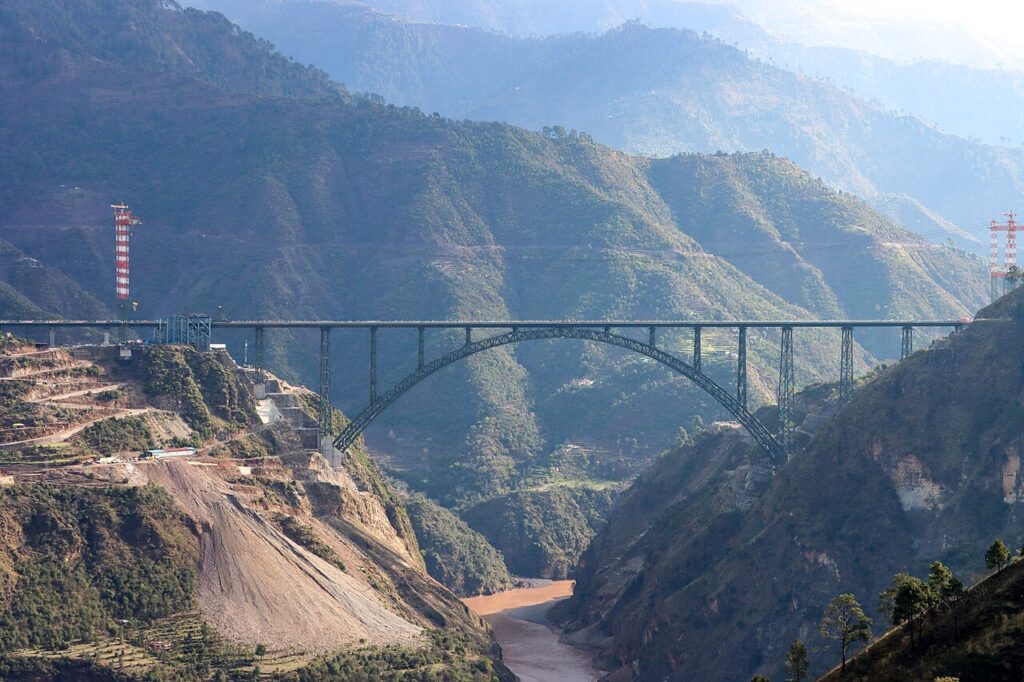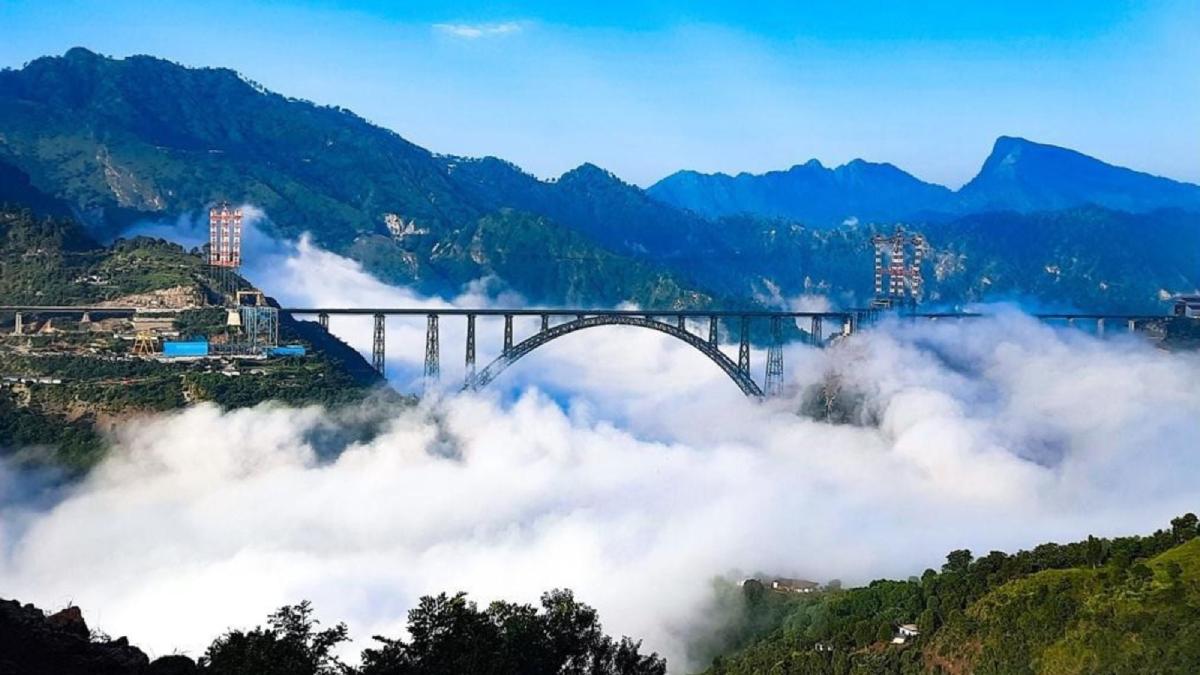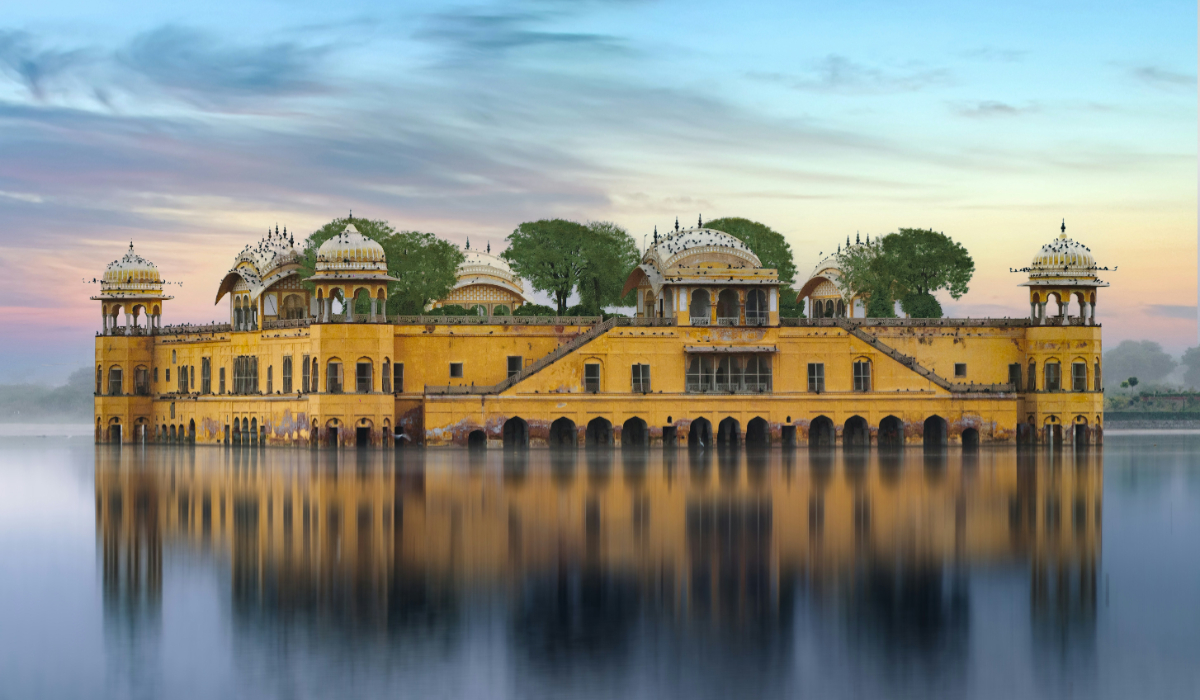On June 6, 2025, India will mark a monumental achievement in engineering and infrastructure with the inauguration of the Chenab Rail Bridge by Prime Minister Narendra Modi.
This bridge, soaring 359 meters above the Chenab River in Jammu and Kashmir’s Reasi district, is the world’s highest railway bridge, surpassing the Eiffel Tower by 35 meters.
It forms a critical link in the Udhampur-Srinagar-Baramulla Railway Link (USBRL), connecting the Kashmir Valley to the rest of India by rail for the first time.
Table of Contents
ToggleLocation and Strategic Importance
- Location: The bridge is situated between the villages of Kauri and Bakkal in the Reasi district of Jammu and Kashmir, spanning the Chenab River.
- Strategic Importance: As part of the USBRL project, the bridge provides all-weather connectivity to the Kashmir Valley, enhancing economic development and national integration.
Engineering Marvel: Design and Construction
- Height: 359 meters (1,178 feet) above the riverbed, making it the tallest railway bridge globally.
- Length: 1,315 meters (4,314 feet), with a main arch span of 467 meters.
- Construction Timeline:
- Project approved: 2003
- Construction commenced: 2004
- Work halted: 2008 (due to safety concerns)
- Construction resumed: 2010
- Arch completion: April 2021
- Bridge construction completed: August 2022
- Track laying completed: March 2023
- Scheduled inauguration: June 6, 2025
- Construction Companies: The project was executed by a joint venture comprising Afcons Infrastructure, VSL India, and Ultra Construction & Engineering Company of South Korea. Design aspects were handled by WSP Finland and Leonhardt Andrä und Partner of Germany. Indian institutions like the Indian Institute of Science (IISc), Bangalore and IIT Delhi contributed to foundational and seismic studies, with the Defence Research and Development Organisation (DRDO) ensuring blast-proofing measures.

Safety and Durability Features
- Seismic Resistance: Designed to withstand earthquakes up to magnitude 8 on the Richter scale.
- Wind Resistance: Capable of enduring wind speeds up to 266 km/h.
- Blast-Proof Design: Incorporates features to withstand potential blasts, enhancing security in the region.
- Design Life: The bridge is expected to have a lifespan of 120 years.
- Structural Integrity: The bridge is designed so that even if a pier supporting the structure gets damaged, it will continue to be operational, allowing trains to pass through at a reduced speed.
Materials and Construction Challenges
- Steel Usage: Approximately 28,660 metric tonnes of steel were used, suitable for temperatures ranging from -10°C to 40°C.
- Construction Challenges: The bridge’s location in a mountainous area with limited infrastructure posed significant challenges, requiring innovative engineering solutions and the use of overhead cable cranes for arch construction, a first for Indian Railways.
Operational Significance
- Vande Bharat Express: The inauguration will also see the launch of two Vande Bharat Express trains connecting Katra and Srinagar, significantly reducing travel time from 6–7 hours to approximately 3 hours.
- Train Numbers and Schedule:
- Train 26401: Departs SMVD Katra at 08:10 hrs, arrives in Srinagar at 11:10 hrs. Operates daily except Tuesdays.
- Train 26402: Departs Srinagar at 14:00 hrs, arrives at SMVD Katra at 18:50 hrs. Operates daily except Tuesdays.
- Train 26403: Departs SMVD Katra at 13:20 hrs, arrives in Srinagar at 18:00 hrs. Operates daily except Wednesdays.
- Train 26404: Departs Srinagar at 08:00 hrs, arrives at SMVD Katra at 12:40 hrs. Operates daily except Wednesdays.
- Key Features:
- All trains will stop at Banihal railway station.
- The distance between SMVD Katra and Srinagar is approximately 191 km.
- Each journey is expected to take around 3 to 4 hours.
- Fares range from ₹660 to ₹880 for AC Chair Car and ₹1,270 to ₹1,515 for Executive Chair Car.
Financial Aspects
- Project Cost: The Chenab Rail Bridge was constructed at an estimated cost of ₹1,486 crore.
- USBRL Project: The bridge is part of the larger USBRL project, which has an estimated cost of ₹46,000 crore, aimed at enhancing connectivity and regional development in Jammu and Kashmir.
Summing Up
The Chenab Rail Bridge stands as a testament to India’s engineering prowess and commitment to enhancing connectivity in challenging terrains.
Its successful completion and impending inauguration mark a significant milestone in the nation’s infrastructural development, promising to boost tourism and economic activity in the Kashmir Valley.



